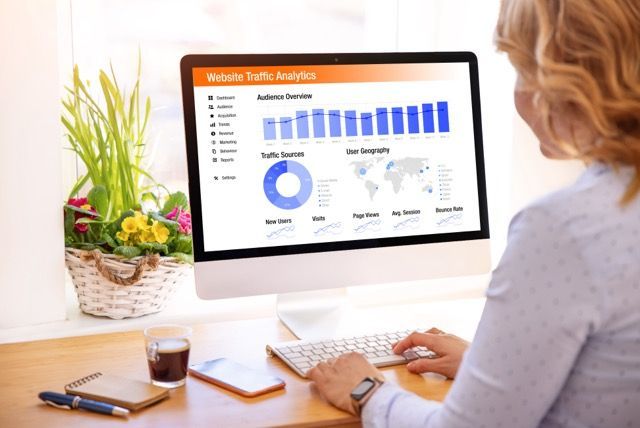Why Data Analytics Is Key to Making Better Marketing Choices
Do you ever feel like your marketing decisions are based on guesswork rather than solid evidence? In today’s digital landscape, it’s easy to get overwhelmed by the sheer number of options available for reaching your audience. From social media and SEO to paid advertising and content marketing, how do you know which strategies will yield the best results?
This is where data analytics comes in. By leveraging data, you can take the guesswork out of your marketing efforts and make informed decisions that drive real results. In this blog post, you’ll learn how data analytics can transform your marketing strategy, helping you target the right audience, optimize campaigns, and ultimately improve your return on investment (ROI). Ready to make smarter marketing choices? Let’s get started.
1. Data-Driven Decisions Lead to Better Results
The most significant advantage of data analytics is that it allows businesses to make informed decisions based on real data, not assumptions. Whether you’re managing a Google Ads campaign or optimizing your website for SEO, data analytics provides critical insights into what is working and what needs improvement.
For example, if you’re running a Google Ads campaign, analytics can reveal which keywords are driving the most conversions, which ads have the highest click-through rates (CTR), and how much each conversion is costing you. Armed with this data, you can adjust your bidding strategy, optimize your ad copy, and focus on the keywords that deliver the highest ROI.
By making data-driven decisions, you reduce the risk of wasting your marketing budget on ineffective strategies. Instead, you can allocate resources to the channels and tactics that produce measurable results.
2. Understanding Your Audience Better
One of the most powerful aspects of data analytics is its ability to provide deep insights into your audience’s behavior. By analyzing user data, you can gain a clear understanding of who your customers are, what they care about, and how they interact with your brand.
For instance, data from your website and social media platforms can show you which pages your visitors spend the most time on, what content they engage with, and which products or services they are most interested in. This kind of data allows you to tailor your marketing messages and campaigns to meet the specific needs and preferences of your audience.
In addition, if you’re using Google Ads, data analytics can help you identify demographic patterns such as age, gender, location, and interests. These insights enable you to target your ads more effectively, ensuring that your message reaches the right people at the right time. Understanding your audience better allows for more personalized and effective marketing efforts.

3. Optimizing Campaigns in Real-Time
In the past, marketers had to wait until the end of a campaign to evaluate its success. But with data analytics, you can monitor the performance of your campaigns in real-time and make adjustments as needed. This is especially valuable when managing paid advertising campaigns, such as Google Ads or social media ads.
For example, if you notice that a specific ad set is underperforming in your Google Ads campaign, data analytics can help you identify the problem. Perhaps the targeting is too broad, or the ad copy isn’t resonating with your audience. With this real-time data, you can make adjustments on the fly, improving your campaign’s effectiveness without waiting for it to end.
Real-time optimization allows you to make the most of your marketing budget and ensure that your campaigns are always performing at their best.
4. Enhancing SEO and Content Strategy
SEO is another area where data analytics can make a significant impact. By analyzing website traffic data, keyword performance, and user behavior, you can identify opportunities to improve your SEO strategy and drive more organic traffic to your site.
For instance, data analytics can reveal which keywords are bringing the most traffic to your website and how those visitors are engaging with your content. If you notice that a particular keyword is driving high traffic but low conversions, it might be a sign that your content isn’t aligned with what users are searching for. By optimizing your content to match user intent, you can improve both your search rankings and your conversion rates.
Additionally, analytics tools can help you track the performance of your content over time, allowing you to identify which topics and formats resonate most with your audience. This information is invaluable for refining your content strategy and ensuring that you continue to produce valuable content that drives results.
5. Measuring ROI and Success
Finally, data analytics is essential for measuring the success of your marketing efforts and calculating your ROI. Without data, it’s difficult to know whether your campaigns are delivering the desired results or if adjustments need to be made.
By tracking key performance indicators (KPIs) such as conversion rates, customer acquisition costs, and lifetime value, data analytics provides a clear picture of how your marketing efforts are performing. This information helps you make informed decisions about where to invest your budget and which channels are driving the best results.
In the case of
Google Ads, analytics can track everything from clicks and impressions to conversions and revenue. By analyzing this data, you can ensure that your advertising budget is being spent efficiently and that your campaigns are generating a positive return on investment.
Data analytics is the key to making smarter marketing decisions. From understanding your audience and optimizing campaigns in real-time to enhancing your SEO strategy and measuring ROI, data provides the insights you need to make informed choices that drive real results.
If you’re ready to elevate your marketing strategy with the power of data,
book a call with us at EDNA Digital Marketing. Our team of experts will help you harness the potential of data analytics to make better marketing choices and improve your ROI. Let’s work together to create a data-driven marketing strategy that takes your business to the next level.










